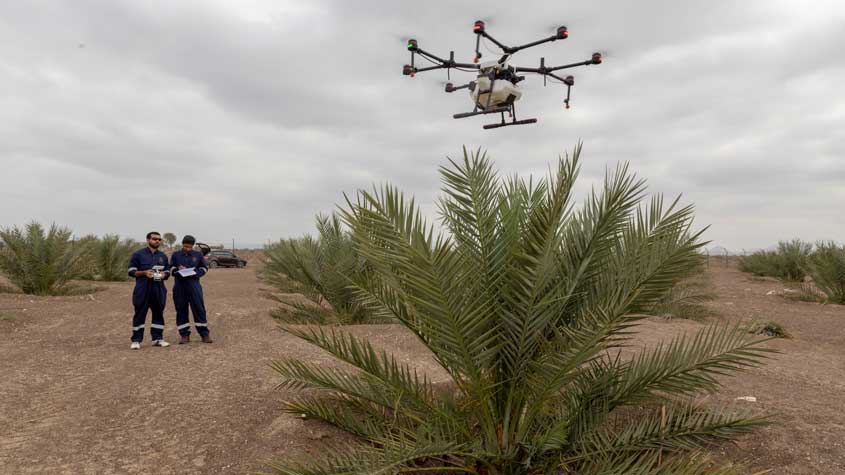Oman: Pollinating Date Palms with AI and Drones
The time frame for pollinating date palms is really narrow, especially for farmers sizeable date palm holdings. There are many species of date palms, each with different female spathes (a large sheathing bract enclosing the flower cluster of the date palm). These flowers do not open at the same time. With conventional methods, each tree has to be climbed at least 3 times to ensure pollination; it is a time-consuming and laborious process which carries a high risk of injury. However, if farmers leave their palms unpollinated, they face significantly reduced date yields.
Wakan Tech, an Omani startup operating in the field of artificial intelligence (AI), robotics, and drones for the agriculture sector, has a solution. The company develops technologies that enable governments, date-producing companies, and private farms to develop cost-effective intelligent solutions that deliver efficiency, safety and productivity. “We believe in drone technology, robotics, and the power of AI to find the most beneficial and convenient solution to satisfy both farm owners and ourselves,” the company notes.

About the company
Wakan was set up by Younis Al-Siyabi, a civil engineer, and Malik Al-Toubi, a chemical engineer. Both graduated from the University of Kentucky, USA, and had previously co-founded another drone & AI company, HAITCH-D. They each hold a UK Civil Aviation Authority (CAA) commercial drone pilot certificate. Wakan Tech is a 100 percent owned and operated Omani startup and is the first company in Oman with CAA-certified commercial drone pilots to offer aerial pollination of date palm trees on a commercial basis.
Younis Al-Siyabi and Malik Al-Toubi were drawn to this area of work by their fond childhood memories of life on the farm. Their aim today, in setting up Wakan Tech, is to use modern technologies to help to preserve Omani agricultural heritage and to reduce date farmers’ dependence on foreign labor.
The company also wants to encourage young people in Oman to take up traditional Omani agricultural practices on their own farms.
About the technology
Wakan Tech’s AI-powered drone features specially designed tanks and nozzles to optimize the delivery of liquid pollen to each palm tree. By using swarm drones in a single farm, the process of pollinating each tree is 30 times faster than conventional pollination methods. Wakan’s approach optimizes the pollen used to pollinate each palm and offers farms significant time and cost savings. In addition, farmers no longer need to hire additional labor for this task since the drones are autonomous and powered by AI.
Intellectual property rights
Recognizing the importance of protecting its technology with intellectual property (IP) rights, in September 2019, the company filed a patent application (OM/P/2019/000383) in Oman for a “Compound and new method to pollinate date palm trees via drones.” And with a view to protecting its technology in multiple countries, in November 2019, Wakan filed an international patent application (PCT/OM2019/050010) under the Patent Cooperation Treaty (PCT).
In filing for patents, Wakan is seeking to protect:
- Its innovative approach to pollinating palms with drones;
- New technical elements of its drone, which make it suitable for pollination, (e.g. a liquid tank, nozzles, valves, etc.);
- A method for preparing the pollinating liquid.
IP rights are at the heart of Wakan Tech’s business strategy. These rights enable them to protect their achievements in the field of palm pollination and also have the potential to enable them to secure the investors and the funding they need to expand their business. The company is now moving forward in its plans to secure trademark rights over its product and industrial design rights over the shape and form of its drone. The software applied to its drone is also protected by copyright.
“We in Wakan Tech believe that we should encourage the new generations to go back and work on the farms they inherited through utilizing technology. We realize the treasure that they have, which they are not aware of, and which would benefit Oman and the region. Palm trees are part of Omani agriculture heritage. Omanis have always had a strong relationship with palm trees and dates are still one of the most popular crops in Oman. Therefore, we had to utilize technologies, such as drones and AI, to ease farm- related work such as pollination, which is a risky and lengthy exercise. Our new approach also an excellent quality of date crops,” the company explains.
“As an agriculture-tech solution company, we totally understand the importance of innovating in green future. We are contributing to reduce the environmental risks through environmentally friendly products such as the pollinating liquid. We promise to produce more such products in the future,” they add.